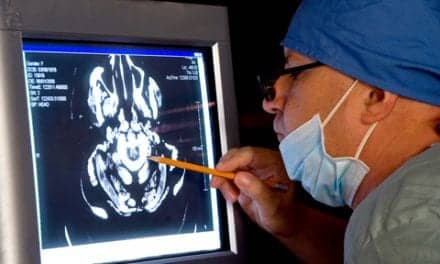
Researchers from the University of Washington (UW) and the Center for Sensorimotor Neural Engineering (CSNE) asked essential tremor patients to draw spirals under three conditions—with their deep brain stimulator turned off (left), with the device constantly on (middle), and with the system developed by UW and CSNE that delivers stimulation as needed (right). In the latter two conditions, patients experienced significant and comparable relief from tremor symptoms that cause their hands to shake. (Photo courtesy of the University of Washington)
Researchers from the University of Washington report the development of a targeted treatment for essential tremor that delivers stimulation only when needed rather than continuously.
Deep Brain Stimulation (DBS), using an electrode implanted deep within the brain and a wire tunneled under the skin connected to a battery in the chest, provides electrical stimulation that quiets essential tremor symptoms. This device is constantly “on,” and delivers stimulation even when a patient doesn’t need it, therefore wasting battery life, notes a media release from the University of Washington.
What sets the current treatment—developed by electrical engineers, UW Medicine researchers, and ethicists at the Center for Sensorimotor Neural Engineering (CSNE) at UW—apart from DBS, per the release, is that it uses electrodes on top of the brain to sense movement in the parts of the body that experience essential tremor, as well as the electrode within the brain, to deliver stimulation only when it’s needed.
The study was published recently in IEEE Transactions on Neural Systems and Rehabilitation Engineering.
The treatment was developed as part of a partnership between the CSNE and medical device manufacturer Medtronic to test new ways of activating Medtronic’s Activa PC+S Deep Brain Stimulation system with essential tremor patients. It is hoped that the treatment could lead toward the development of fully implanted, closed-loop deep brain stimulators to treat essential tremor and Parkinson’s disease that at some point could be controlled by the patient’s own thoughts or movements.
“We’d ultimately like to give individuals that ability and choice,” says co-author Margaret Thompson, a UW electrical engineering doctoral candidate and among the researchers at CSNE, who helped develop the treatment method, in the release.
“One side effect of deep brain stimulation can be difficulty speaking, for instance. So if you’re about to drink a glass of water, you might want to turn up the stimulation so your hand doesn’t shake. If you’re answering the phone, perhaps you’d want to turn it down so your speech isn’t affected.
UW electrical engineering professor Howard Chizeck adds in the release that, “We’re saving about half of the battery power, based on our subjects so far, which was one of our main motivations. But even more interesting are some early indications that suggest our closed-loop system results in better patient performance, with less tremor, better control of their hands and fewer side effects.”
[Source(s): University of Washington, Newswise]




